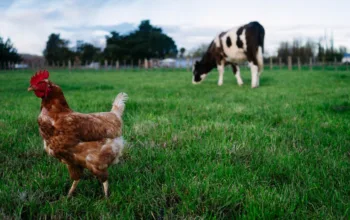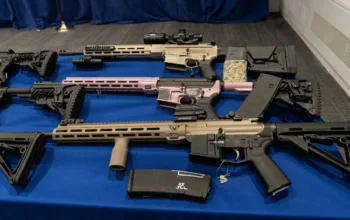Mueller has been conducting a broad investigation into Trump and his associates’ Russia ties going far beyond Manafort.
Now that Paul Manafort has been found guilty of financial crimes, where does that leave special counsel Robert Mueller’s Russia investigation?
Two years after the probe began, and 15 months after Mueller took charge of it, what investigators have found on the central question — whether there was a conspiracy between Trump associates and Russians to interfere with the 2016 election — remains deeply mysterious.
We’ve seen Trump aides charged with (Rick Gates) and convicted of (Paul Manafort) separate financial and lobbying crimes. We’ve seen Trump aides charged for lying to investigators about their contacts with Russians (George Papadopoulos and Michael Flynn). And we’ve seen 25 Russians charged with interfering with the campaign (through social media or email hacking).
But no Trump aide has yet been charged with actually working with Russia or other foreign actors to interfere with the election. As a result, the president and his defenders have loudly claimed that Mueller has come up empty on the main topic he was supposed to be investigating.
The Witch Hunt finds no Collusion with Russia – so now they’re looking at the rest of the World. Oh’ great!
— Donald J. Trump (@realDonaldTrump) May 20, 2018
In reality, we have no idea what Mueller has or has not found so far regarding “collusion.” But we know that investigation into Trump-Russia ties is still very active.
This year, the special counsel’s team has surprised Russian oligarchs at airports, subpoenaed Trump’s business for documents, investigated mysterious meetings with a Russian fund manager in Seychelles, studied the Trump campaign’s digital operations and the Trump inauguration’s fundraising for potential Russian ties, dug further into Don Jr.’s infamous Trump Tower meeting, and hauled a plethora of Roger Stone’s associates before a grand jury. They’ve also engaged in a back-and-forth with Trump’s lawyers about questions they want him to answer.
And now the lawyer for Michael Cohen, Trump’s former lawyer, is claiming that Cohen, who pleaded guilty in federal court on Tuesday, is saying that Cohen has information Mueller might be interested in — which, if true, could spark new avenues for the investigation.
Overall, though, Mueller’s ultimate endgame in all this remains far from clear. Will the investigation fizzle out without any further actions of note? Or are we headed for a new series of indictments coming even closer to Trump’s inner circle? Or will Mueller’s team submit a report to Congress laying the grounds for possible impeachment of the president of the United States? The special counsel, unsurprisingly, isn’t saying.
The big picture is that while Manafort’s conviction is in a sense a milestone for investigators, as it’s their first victory at trial, it’s also something of a sideshow. Unless the verdict spurs Manafort to start cooperating with investigators — something he’s shown no signs of considering so far — it won’t necessarily mean much for the many other moving parts of Mueller’s Russia investigation, which have been in motion for some time.
The charges so far
So far, the actual charges the special counsel has brought fall into three main buckets:
- Trump aides who lied to investigators about their contacts with Russians: George Papadopoulos and Michael Flynn both struck plea deals in which they admitted to making Russia-related false statements to investigators, and agreed to cooperate with Mueller’s team.
- Russians who interfered with the 2016 campaign: The special counsel filed two cases this year that, together, indicted 25 Russian nationals — some for a propaganda effort designed to interfere with the 2016 campaign, and others in relation to the hackings and leaks of leading Democrats’ emails.
- Manafort’s lobbying and money: Mueller also took over a preexisting FBI investigation into Paul Manafort’s finances and his work for the government of Ukraine. His team initially charged both Manafort and his longtime right-hand man Rick Gates with financial and lobbying crimes, and Gates eventually struck a plea deal. More recently, Manafort and a Russian associate of his, Konstantin Kilimnik, were charged for attempted witness tampering. (Manafort’s Virginia trial is now over, but his separate trial in Washington, DC, on other charges still lies ahead.)
As serious as these charges are, it is true that none of them directly allege that Trump associates criminally conspired with Russians to interfere with the 2016 election.
However, many believe that Mueller is using these indictments as, essentially, building blocks for his larger case on that central matter.
They’ve made the case that Russia truly did interfere with the 2016 election, and revealed more specifics about how that happened: via hacking and social media influence campaigns. They’ve also caused three former Trump aides — Papadopoulos, Flynn, and Gates — to become cooperators, which has opened up new areas of investigation.
What Mueller has been investigating — but hasn’t charged (yet, at least)
Though Mueller’s team has been amazingly leak-proof, we have gotten clues about what they’ve been up to through leaks from people they’ve come into contact with — the people they’ve questioned, their lawyers, and other government officials involved in certain aspects of the probe.
The takeaway from many of those accounts matches that of Kristin Davis, a longtime associate of Roger Stone who testified before the grand jury last week. “I think they’re genuinely concerned about whether or not any collusion happened with Russia,” Davis told CNN’s Chris Cuomo. “Their line of questioning really did revolve around whether or not this happened.”
Indeed, this year Mueller’s investigators have delved deep into Trump and his associates’ ties to Russia with the apparent goal of understanding whether a conspiracy to interfere with the 2016 election did take place, and if so, what it entailed.
- The Trump Organization: Early this year, Mueller’s team subpoenaed Trump’s business for documents, including some related to Russia, the New York Times reported.
- Russian oligarchs: Mueller’s team surprised two Russian oligarchs at US airports this year, and questioned them about their ties to people in Trump’s orbit. He seized electronic devices from one oligarch.
- The Trump campaign’s digital operation: Mueller’s team interviewed people involved with Trump’s digital team with an eye toward understanding whether they’d coordinated with Russian online efforts, Yahoo News and ABC News have reported.
- Trump’s inauguration: The special counsel has also investigated Russia-tied donations to Trump’s inaugural committee, and the “unusual access” that certain Russians got to inaugural events, per ABC News.
- The Seychelles meeting and Gulf money: Shortly before Trump’s inauguration, a donor of his (Erik Prince) held a mysterious meeting in Seychelles with a Russian fund manager. The meeting was facilitated by the crown prince of the United Arab Emirates and his adviser, George Nader. It has also emerged that after Don Jr.’s Russian meeting at Trump Tower, he held another meeting about election assistance — with Prince and Nader. Mueller’s team served Nader with a subpoena in the US and has brought him before the grand jury. Keep an eye on this one.
- Roger Stone’s associates: Particularly in the past few months, Mueller has sought to question many people in the orbit of longtime on-and-off Trump adviser Roger Stone. Stone was in contact with WikiLeaks and the Guccifer 2.0 persona (which was run by Russian intelligence) during the campaign, making him a figure of interest in the question of whether Trump associates were involved in the release of those stolen Democratic emails.
- Obstruction of justice: On top of that, there is Mueller’s investigation into whether President Trump obstructed justice while in office — in pressuring then-FBI Director James Comey to drop an investigation into Michael Flynn, later firing Comey, pressuring Attorney General Jeff Sessions, and a plethora of other actions. The special counsel’s team interviewed many current and former White House and administration officials about these topics last year.
- The presidential interview: Finally, Mueller’s team requested back in January that President Trump agree to an interview. We know from a list of leaked questions that the special counsel wants to ask about collusion, obstruction of justice, and Trump’s ties to Russia generally. The president has spent about seven months refusing to agree to this request since.
It’s worth keeping in mind that we have no idea if any charges will end up being brought on any of these matters — it’s possible that some of these investigative avenues led nowhere, or that the evidence is too thin on some. However, also keep in mind that this isn’t by any means everything that Mueller is investigating, either.
The bigger picture is clear — Mueller has conducted an extremely thorough investigation going beyond Paul Manafort that has focused on whether Donald Trump and people in his orbit criminally conspired with Russia to interfere with the 2016 campaign. And that investigation is not yet over.
Author: Andrew Prokop


